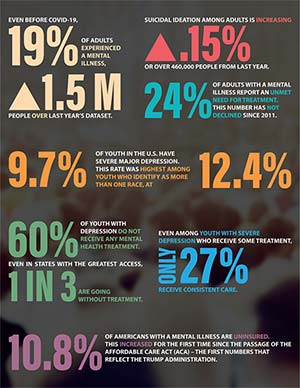Physical Therapy Info Health Tips
Our Integrated Physical Therapy blog, your go-to source for physical therapy articles and holistic health information. We provide expert insights, practical physical therapy tips, and the latest developments in the field. Whether you're recovering from an injury, managing chronic pain, or looking to improve your overall well-being, our physical therapy blog covers a variety of helpful topics.
Our goal is to empower you with the information you need to take an active role in your health and recovery. Ready to schedule an appointment and take control of your health? Contact Integrated Physical Therapy at 305-967-8976.
Mental Health Awareness
Naomi Osaka withdrew from the French Open, one day after tennis officials threatened to suspend her and fined her $15,000 over her decision not to do media interviews during the tournament to prioritize her mental health. Osaka described, "The truth is that I have suffered long bouts of depression since the U.S. Open in 2018 and I have had a really hard time coping with that,"
Right on the heels of Mental Health Month whose goal is to raises awareness of trauma and the impact it can have on the physical, emotional, and mental well-being of children, families, and communities.
Stats
Youth mental health is worsening. 9.7% of youth in the U.S. have severe major depression, compared to 9.2% last year (Mental Health America report). This rate was highest among youth who identify as more than one race, at 12.4%.
Even before COVID-19, the prevalence of mental illness among adults was increasing. In 2017-2018, 19% of adults experienced a mental illness, an increase of 1.5 million people over last year.
Mental health problems are on the rise among adolescents and young adults Social media may be a driver along with declining sleep duration among adolescents and adults could be behind the increase. According to a new study, published by the American Psychological Association, rates of mood disorders and suicide-related outcomes have increased significantly over the last decade among these age groups, impacting females in particular.
In addition to being less likely to interact face-to-face, those who use social media frequently are also more likely to be involved with cyber-bullying, which has been linked to depression, self-harm, and suicidal thoughts.
What WE Can Do
Here are some simple steps we can take to help raise the collective consciousness about mental health:
- Talk with everyone you know. Ask family, friends and coworkers how they’re doing and really listen to the answers. If they give any indication that they are depressed or stressed out, let them know that there are resources available to help them. - If you sense that they might be considering self-harm or suicide, encourage them to seek help immediately and assist them as appropriate.
- Open up about your experience. If you’ve struggled or are struggling with mental illness, share your story. Hearing another person is going through the same thing you are can be a relief. And, it can be the nudge a person needs to get help and look into treatment.
- Encourage kind language. When you hear people around you talk about mental illness in disparaging terms, politely ask them to consider the impact of their words. Any language that reinforces the stigma of mental illness is harmful and might keep someone from getting help.
- Educate yourself about mental illness. It’s not uncommon for people to misunderstand mental illness. Learn more about it and share what you learn. This includes talking with children about mental health in age-appropriate terms. Children are not immune to mental illness and can experience conditions like depression and anxiety as early as elementary school.
- Volunteer. Mental health organizations like Community Reach Center frequently need help with specific initiatives and ongoing efforts. Your phone call or email will be greeted with heartfelt appreciation.
- Leverage social media. Platforms like Facebook and Twitter can be great forums for inspiring people to be open-minded and inquisitive when it comes to mental illness.
- Encourage physical health that supports mental health. Help people understand that physical health can have a direct impact on mental health. Eating healthy and getting plenty of exercise and sleep all play a part in a person’s mental and emotional state.
(https://www.communityreachcenter.org/)
 https://mhanational.org/issues/state-mental-health-americaNeed for Treatment
https://mhanational.org/issues/state-mental-health-americaNeed for Treatment
There is still unmet need for mental health treatment among youth and adults. 60% of youth with major depression did not receive any mental health treatment in 2017-2018. Even in states with the greatest access, over 38% are not receiving the mental health services they need. Among youth with severe depression, only 27.3% received consistent treatment. 23.6% of adults with a mental illness reported an unmet need for treatment in 2017-2018. This number has not declined since 2011.
The percentage of adults with a mental illness who are uninsured increased for the first time since the passage of the Affordable Care Act (ACA). Nationally, 10.8% are uninsured, totaling 5.1 million adults. This figure differs dramatically across states – in New Jersey (ranked #1) 2.5% of adults with AMI are uninsured, compared to 23% in Wyoming (ranked #51).
The number of people looking for help with anxiety and depression has skyrocketed. From January to September 2020, 315,220 people took the anxiety screen, a 93 percent increase over the 2019 total number of anxiety screens. 534,784 people took the depression screen, a 62 percent increase over the 2019 total number of depression screens.
Young people are struggling most with their mental health. The proportion of youth ages 11-17 who accessed screening was 9 percent higher than the average in 2019. Not only are the number of youth searching for help with their mental health increasing, but throughout the COVID-19 pandemic youth ages 11-17 have been more likely than any other age group to score for moderate to severe symptoms of anxiety and depression.



Comments